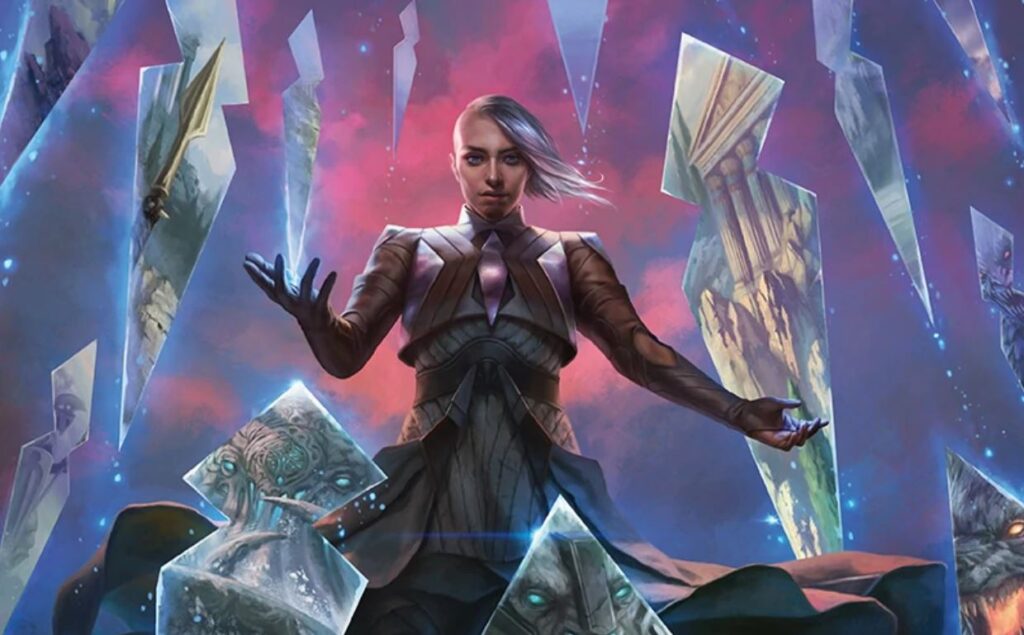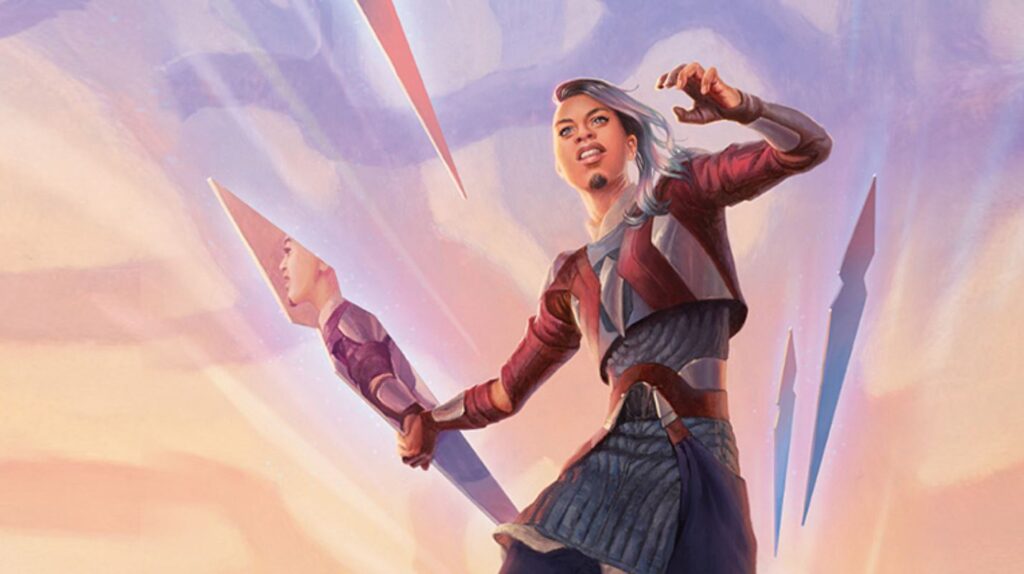
Niko Aris, the First Non-Binary Planeswalker, Is Vital for Magic the Gathering’s Future
Even with the introduction of Niko Aris, Magic has always had a bit of a tempestuous relationship with queerness. The most (in)famous moment in this history came from the novel War of the Spark: Forsaken, telling a story around the set of the same name, and released in November 2019. The relationship between major characters Chandra and Nissa – both of whom are Planeswalkers; magical, world-hopping beings that propel the narrative of Magic – had always been seen as having romantic undertones, but Forsaken ended up taking this thread and throwing it away, with Greg Weisman writing “On Ravnica, in the wake of Gideon’s death and Bolas’, they had admitted to each other that they loved. But both of them knew deep down they were only speaking platonically.” These lines undermined the way that the characters and their relationship developed across multiple worlds, and queer fans of the book made their discontent with Wizards of the Coast known.
And that’s why the latest standard set – the Norse-inspired Kaldheim that released in late January – is so important. Because one of the new Planeswalkers being introduced into Magic, Niko Aris, is non-binary. Wizards have written non-binary and queer characters before in the storied history of Magic, but the recent missteps that came to define Forsaken clearly show that Wizards still have a lot to learn when it comes to writing queer characters. The ways in which the relationship between Nissa and Chandra’s relationship was made to be platonic shows that writing queer characters alone isn’t enough if old tropes around queerbaiting are still going to rear their head. Writing queer characters is one thing, it’s another to explore their identities with the depth and empathy that they deserve; Niko seems like a character who might just be getting this kind of treatment from Wizards as Kaldheim comes out.
Niko’s gender has the potential to be a fascinating part of their character and story, in a way that feels unique to fantasy franchises like Magic, which have the room to take root in a version of world history, but subvert and challenge the expectations that come with it. Niko originally comes from the world of Theros, Magic’s answer to Ancient Greek mythology; because of this, Theros is a world that has a strong sense of being gendered, as well as having a very direct relationship with the idea of fate. Fate is made real on Theros by Klothys, the God of Destin; her duty on the pantheon of Theros is to ensure that the fates of individuals come to pass. Early on in their life, Niko learned that the power of Klothys wasn’t absolute, that they could control their own destiny, rebelling against the future foretold to them – as an undefeated athlete – by deliberately throwing a contest.
After emerging from the underworld during the storyline of Theros: Beyond Death (the Magic set from January of 2020), Klothys became determined to capture those who were rebelling against their fate, with Niko among them. During a confrontation with one of Klothys’ agents, Niko’s Planeswalker spark ignited, awakening their powers and allowing them to move worlds away from those in Theros that would try and force them onto the narrow path of destiny.
The fact that Niko’s narrative is driven by an act of rebellion feels like a breath of fresh air; even now, so many stories around queer identity are rooted in the act of coming out, to see Niko being driven by an already secure sense of self – and a refusal to change in order to fit the narrow definitions of others – is something that immediately feels powerful and resonant from a queer perspective. Niko already knows who they are, and is instead driven by the desire to find out what kind of person they’ll be. That’s what makes Kaldheim such an interesting place to meet Niko for the first time; like Theros, Kaldheim is a world of gods, heroes, and combat. The shadow of fate also looms large in Kaldheim with the image of the World Tree, but here no-one is trying to force Niko to become a certain type of person, and in being on Kaldheim, they’re able to forge their own destiny.

The groundwork being laid for Niko’s story feels like a major move from Wizards, especially in the wake of the controversy surrounding Forsaken. Magic has had non-binary characters in the past, and they’ve all come from vastly different backgrounds, from Elven archers to being of pure energy, but Niko is the franchise’s first non-binary Planeswalker, and this feels major because Planeswalkers have become the face of Magic in all aspects, from the way the game is promoted, to the kind of stories that it tells. By creating a non-binary Planeswalker who doesn’t feel the need to “come out” as part of their story, Magic is trying to create queer stories that do more than just rehash traditional narrative beats, but in a magical setting. In fact, it’s the settings and world building of Magic that allow it to create characters like Niko.
Often, the worlds of Magic are informed by real geography and history, from the mythological inspiration of Theros and Kaldheim, the geographical cues taken by Kaladesh (drawing on aesthetics associated with India, and cyberpunk fiction), and Kamigawa (rooted in Japanese culture), which is what allows them to explore these historical and mythological traditions in a way that feels contemporary. Of course, this can lead to outcry from a certain kind of player, who finds the idea of a black Viking on a world full of magic swords and world-eating wolves to be somehow unrealistic. But the joy of a game like Magic is the fact that it can not only take certain elements of history, but also challenge the norms that are associated with them.
That’s what makes Niko such an interesting example of where Magic is right now in terms of storytelling, as well as the kind of queer narratives that we’re getting in other games. A world like Theros, where so many of its great warriors are men, and the thread of fate is seen as inescapable, becomes the perfect place to begin the story of a character like Niko. Their origin is not only an indication of the rigid world that they come from, but also the ways in which those norms can be challenged. The fact that Niko’s story flies in the face of the norms of Theros – and the greek mythology that inspires it – shows the power that fantasy storytelling has to turn the world on its head. This act of rebellion against norms and expectations is at the core of what Niko does as a character; their presence is seen as something impossible for the world of Theros to comprehend, a revolt against the Gods themselves. This rebellion is an act that feels inherently queer, a resistance rooted in the power that comes from knowing who you are, and refusing to change that.
Niko’s story is an echo of queer stories all through history, a reminder that we’ve always been here, and always will be.







There has been a lot of pushback from POC and LGBTQ+ communities toward magic in the last year, especially as it comes to their hiring practices.
The line about platonic friendship is evidence of their perspective. And while it is a totally valid perspective, for most readers-into of that relationship it is a pointed rebuke. In my experience, MTG has definitely tried harder than most long-standing games to be inclusive, so I am happy that they’re taking these steps.
Niko is not the first non-binary planeswalker. Ashiok is genderless, as is the entire race of Nightmares.
Nonetheless, I’m happy Wizards is heading in this direction! The more diverse, the better.
Yay for Ashiok and Karn erasure!
Both nonbinary. Both Planeswalkers. Both introduced as/ became such (respectively) prior to Niko. I love representation! I also love accuracy and dont particularly enjoy misrepresentation.